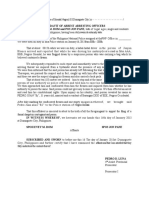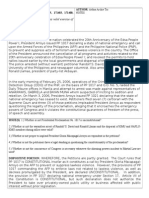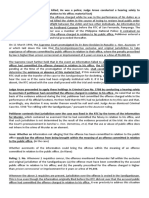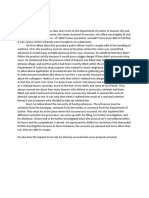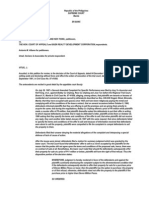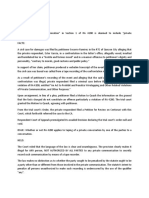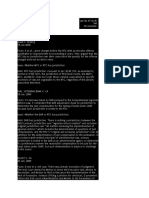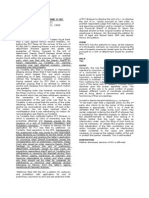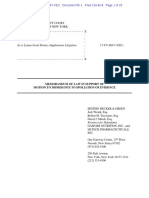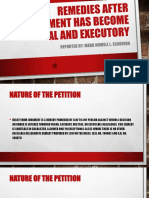Pestilos vs. People PDF
Pestilos vs. People PDF
Uploaded by
Lee JinCopyright:
Available Formats
Pestilos vs. People PDF
Pestilos vs. People PDF
Uploaded by
Lee JinOriginal Title
Copyright
Available Formats
Share this document
Did you find this document useful?
Is this content inappropriate?
Copyright:
Available Formats
Pestilos vs. People PDF
Pestilos vs. People PDF
Uploaded by
Lee JinCopyright:
Available Formats
JOEY M. PESTILOS, et. al.v.
MORENO GENEROSO AND PEOPLE OF
THE PHILIPPINES
G.R. No. 182601, 10 November 2014, SECOND DIVISION (Brion, J.)
Personal knowledge of a crime just committed does not require actual presence at the scene
while a crime was being committed; it is enough that evidence of the recent commission of the crime is
patent and the police officer has probable cause to believe based on personal knowledge of facts or
circumstances, that the person to be arrested has recently committed the crime.
On February 20, 2005, at around 3:15 in the morning, an altercation ensued
between petitioners Joey M. Pestilos, Dwight Macapanas, Miguel Gaces, Jerry
Fernandez, and Roland Muoz and Atty. Moreno Generoso. The police officers
arrived at the scene of the crime less than one hour after the alleged altercation and
they saw Atty. Generoso badly beaten.cAtty. Generoso then pointed to the
petitioners as those who mauled him, which prompted the police officers to "invite"
the petitioners for investigation. At the inquest proceeding, the City Prosecutor
found that the petitioners stabbed Atty. Generoso with a bladed weapon.
Consequently, the petitioners were indicted for attempted murder.
The petitioners filed an Urgent Motion for Regular Preliminary
Investigation on the ground that they had not been lawfully arrested as there was no
valid warrantless arrest since the police officers had no personal knowledge that they
were the perpetrators of the crime. Thus, the inquest proceeding was improper, and
a regular procedure for preliminary investigation should have been performed.The
Regional Trial Court (RTC) denied the petitioners' Motion. On petition for certiorari
before the Court of Appeals (CA), the petition was dismissed for lack of merit. The
petitioners moved for reconsideration, but the CA denied the motion.
ISSUE:
Whether the petitioners were validly arrested without a warrant
RULING:
The petitioners were validly arrested. In light of the discussion on the
developments of Section 5(b), Rule 113 of the Revised Rules of Criminal Procedure
and our jurisprudence on the matter, we hold that the following must be present for
a valid warrantless arrest: 1) the crime should have been just committed; and 2)
the arresting officer's exercise of discretion is limited by the standard of probable
cause to be determined from the facts and circumstances within his personal
knowledge. The requirement of the existence of probable cause objectifies the
reasonableness of the warrantless arrest for purposes of compliance with the
Constitutional mandate against unreasonable arrests.
UST Law Review, Vol. LIX, No. 1, May 2015
To summarize, the arresting officers went to the scene of the crime upon
the complaint of Atty. Generoso of his alleged mauling; the police officers
responded to the scene of the crime less than one (1) hour after the alleged
mauling; the alleged crime transpired in a community where Atty. Generoso and the
petitioners reside; Atty. Generoso positively identified the petitioners as those
responsible for his mauling and, notably, the petitioners and Atty. Generoso lived
almost in the same neighborhood; more importantly, when the petitioners were
confronted by the arresting officers, they did not deny their participation in the
incident with Atty. Generoso, although they narrated a different version of what
transpired.chanRoblesvirtualLawlibrary
With these facts and circumstances that the police officers gathered and
which they have personally observed less than one hour from the time that they
have arrived at the scene of the crime until the time of the arrest of the petitioners,
we deem it reasonable to conclude that the police officers had personal knowledge
of facts or circumstances justifying the petitioners' warrantless arrests. These
circumstances were well within the police officers' observation, perception and
evaluation at the time of the arrest. These circumstances qualify as the police
officers' personal observation, which are within their personal knowledge,
prompting them to make the warrantless arrests.
In determining the reasonableness of the warrantless arrests, it is incumbent
upon the courts to consider if the police officers have complied with the
requirements set under Section 5(b), Rule 113 of the Revised Rules of Criminal
Procedure, specifically, the requirement of immediacy; the police officer's personal
knowledge of facts or circumstances; and lastly, the propriety of the determination
of probable cause that the person sought to be arrested committed the crime.
The records show that soon after the report of the incident occurred, SPOl
Monsalve immediately dispatched the arresting officer, SP02 Javier, to render
personal assistance to the victim. This fact alone negates the petitioners' argument
that the police officers did not have personal knowledge that a crime had been
committed - the police immediately responded and had personal knowledge that a
crime hadbeen committed.
chanRoblesvirtualLawlibrary
UST Law Review, Vol. LIX, No. 1, May 2015
You might also like
- G R No 195671 ROGELIO J GONZAGA Vs PEOPLE OF THE PHILIPPINESNo ratings yetG R No 195671 ROGELIO J GONZAGA Vs PEOPLE OF THE PHILIPPINES7 pages
- AAR Re Rank Inspection and PICE For The Month of October 2022100% (1)AAR Re Rank Inspection and PICE For The Month of October 20222 pages
- Herminio Buenaventura vs. People G.R. NO. 171578, AUGUST 8, 2007No ratings yetHerminio Buenaventura vs. People G.R. NO. 171578, AUGUST 8, 20073 pages
- Francisco V People, G.R. No. 177720, February 18, 2009No ratings yetFrancisco V People, G.R. No. 177720, February 18, 20093 pages
- Art 1156 - Ang Yu Asuncion Vs CA GR No 109125 December 2, 1994100% (1)Art 1156 - Ang Yu Asuncion Vs CA GR No 109125 December 2, 19948 pages
- RULE 111 - Prosecution of Civil Action Cases100% (1)RULE 111 - Prosecution of Civil Action Cases28 pages
- Itm PPT Case Data Driven Approach FinalNo ratings yetItm PPT Case Data Driven Approach Final13 pages
- Plaintiff-Appellee Accused-Appellant: People of The Philippines, Aubrey Enriquez SoriaNo ratings yetPlaintiff-Appellee Accused-Appellant: People of The Philippines, Aubrey Enriquez Soria11 pages
- Quisay v. People - GR No. - J. Perlas-Bernabe - January 13, 2016 - Who Must Prosecute100% (1)Quisay v. People - GR No. - J. Perlas-Bernabe - January 13, 2016 - Who Must Prosecute3 pages
- The Community and Service - Oriented Policing System Is Suffering A SetbackNo ratings yetThe Community and Service - Oriented Policing System Is Suffering A Setback2 pages
- Section 3 - Anti-Wiretapping Law - RAMIREZ vs. CANo ratings yetSection 3 - Anti-Wiretapping Law - RAMIREZ vs. CA2 pages
- (G.R. No. 149453. April 1, 2003) : Resolution Callejo, SR., J.No ratings yet(G.R. No. 149453. April 1, 2003) : Resolution Callejo, SR., J.9 pages
- People of The Philippines vs. Nocum G.R. No.179041 April 1, 2013 FactsNo ratings yetPeople of The Philippines vs. Nocum G.R. No.179041 April 1, 2013 Facts5 pages
- 562 Supreme Court Reports Annotated: Tibo vs. The Provincial CommanderNo ratings yet562 Supreme Court Reports Annotated: Tibo vs. The Provincial Commander10 pages
- Batas Pambansa Blg. 881 - Omnibus Election Code of The PhilippinesNo ratings yetBatas Pambansa Blg. 881 - Omnibus Election Code of The Philippines53 pages
- GR. No. 187229: February 22, 2012 Facts: Petitioner Arnel Sison y Escuadro Was Charged For Kidnapping With Rape and Violation ofNo ratings yetGR. No. 187229: February 22, 2012 Facts: Petitioner Arnel Sison y Escuadro Was Charged For Kidnapping With Rape and Violation of1 page
- 283 Ganesh Patel V Umakant Rajoria 7 Mar 2022 412257No ratings yet283 Ganesh Patel V Umakant Rajoria 7 Mar 2022 4122572 pages
- United States v. Watson, 4th Cir. (1996)No ratings yetUnited States v. Watson, 4th Cir. (1996)14 pages
- 4 People Vs Pambid G.R. No. 124453. March 15, 2000No ratings yet4 People Vs Pambid G.R. No. 124453. March 15, 20002 pages
- Vidad v. RTC Negros Oriental Branch 42, 1993 PDFNo ratings yetVidad v. RTC Negros Oriental Branch 42, 1993 PDF2 pages
- Traders Royal Bank Vs Iac Digest - Page 3 Post MidtermsNo ratings yetTraders Royal Bank Vs Iac Digest - Page 3 Post Midterms1 page
- Petitioner Respondent: Alma C. Lugawe, - Pacific Cebu Resort International, Inc.No ratings yetPetitioner Respondent: Alma C. Lugawe, - Pacific Cebu Resort International, Inc.17 pages
- Motion For Leave of Court To Subpoena Third-Party RecordsNo ratings yetMotion For Leave of Court To Subpoena Third-Party Records10 pages
- Motion To Dismiss in Lieu of Spoilation of EvidenceNo ratings yetMotion To Dismiss in Lieu of Spoilation of Evidence26 pages
- N - People of The Philippines vs. Geraldo SantillanNo ratings yetN - People of The Philippines vs. Geraldo Santillan2 pages
- Evidentiary Value of FIR, DELAY IN LODGINGNo ratings yetEvidentiary Value of FIR, DELAY IN LODGING16 pages
- LImketkai Sons Milling v. Court of Appeals (261 SCRA 464)No ratings yetLImketkai Sons Milling v. Court of Appeals (261 SCRA 464)11 pages
- Presado Vs Genova, AM NO. 91-657, June 21, 1993No ratings yetPresado Vs Genova, AM NO. 91-657, June 21, 19932 pages
- Remedies After Judgment Has Become Final and Executory100% (1)Remedies After Judgment Has Become Final and Executory48 pages
- Aznar III vs. Bernad: - Second Div IsionNo ratings yetAznar III vs. Bernad: - Second Div Ision10 pages











